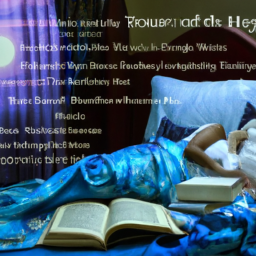In the morning, have you ever woken up feeling completely exhausted, as if you had just run a marathon in your dreams? I have definitely felt this way before.
It’s not uncommon to experience dreams where we find ourselves running from something or someone. Whether it’s a terrifying monster, an unknown danger, or simply trying to catch up with someone or something that’s ahead of us, running seems to be a common theme in our dreams.
But why do we dream about running so often?
In this article, we will explore the various psychological and neurological theories behind why we always seem to be on the run in our dreams. We’ll also delve into symbolic interpretations and cultural beliefs about running dreams and discuss how lucid dreaming and dream journals can help us gain control over these recurring themes.
Additionally, we’ll examine the effects of these dreams on our mental and emotional well-being and explore other common dream themes that may shed light on why we are always running in our sleep.
Key Takeaways
- Running in dreams can be triggered by stress, anxiety, unresolved emotions, and trauma.
- Understanding the symbolic interpretations of running in dreams can provide valuable insights into one’s subconscious mind.
- Recurring dreams can have an impact on mental and emotional well-being, and taking care of mental health is crucial for reducing the intensity of recurring dreams.
- Dream interpretation is a powerful tool for self-reflection and analyzing subconscious thoughts and feelings, and understanding the meaning behind recurring dreams can lead to resolving issues impacting mental and emotional well-being.
Common Occurrence of Running in Dreams
It’s super common to be sprinting through your dreams! Dream interpretation experts have found that running in dreams is one of the most frequent occurrences, and it can mean different things depending on the context.
In general, running away from something or someone in a dream represents a desire to escape from challenging situations or avoid confrontation. This could be related to work stress, relationship issues, or personal fears.
On the other hand, running towards something or someone in a dream may indicate a pursuit of goals or desires. It could symbolize enthusiasm, ambition, and determination to achieve success. However, if the dreamer feels exhausted while running or cannot reach their destination no matter how hard they try, it may suggest an obstacle or challenge standing in their way.
Overall, understanding the significance of symbols in dreams can provide valuable insights into one’s subconscious mind and help them navigate through life challenges with greater awareness and clarity. Moving onto psychological theories…
Psychological Theories
I’ve always wondered why I’m always running in my dreams. After some research, I found out that psychological theories suggest that stress and anxiety can trigger these types of dreams.
Additionally, unresolved emotions or problems can also contribute to this recurring dream theme. Furthermore, trauma is another potential factor behind the constant running in one’s dreams.
These theories suggest that our subconscious mind uses dream scenarios as a way to process and deal with difficult experiences we may have faced in our waking lives. It’s fascinating how our minds work and how they manifest in our dreams.
Stress and Anxiety
Feeling overwhelmed and uneasy, my heart races as I sprint through the deserted streets in my recurring dreams. Stress and anxiety have been known to cause vivid dreams that often reflect our deepest fears and concerns.
When we experience stressful situations in real life, our brains may process these events during sleep, causing us to dream about them. The causes of stress and anxiety can vary from person to person, but coping mechanisms are essential for managing these emotions.
Engaging in relaxation techniques such as meditation or yoga can help reduce stress levels before bedtime. Limiting caffeine intake and practicing good sleep hygiene can also promote better quality sleep, which may decrease the frequency of anxiety-related dreams. By taking care of our mental health and finding healthy ways to cope with stressors in our lives, we may be able to reduce the intensity of recurring dreams that involve running or other fear-based scenarios.
As unresolved emotions or problems continue to linger in our minds, they may manifest themselves through our dreams. While coping mechanisms are important for dealing with everyday stressors, it’s equally crucial to address any underlying emotional issues that may be contributing to recurrent nightmares.
In the next section, we’ll explore how unresolved emotions or problems could be impacting our dream patterns.
Unresolved Emotions or Problems
You may have unresolved emotions or problems that are like a weight on your mind, affecting the content of your dreams. Dreaming is often our subconscious trying to process and work through unresolved issues in our waking lives.
Here are three ways this could be manifesting in your dream:
- Running away from something: This could represent avoiding confronting an issue or problem that needs attention.
- Never reaching the destination: This could symbolize feeling stuck or unable to move forward in life due to unaddressed emotions or problems.
- Chasing after something: This could indicate a desire for something that feels just out of reach, possibly due to past trauma or unfulfilled emotional needs.
Exploring these themes within your dreams can be a valuable tool in the healing process, allowing for introspection and growth. Understanding the underlying causes of recurring dream patterns can help uncover deep-seated emotional wounds that need attention.
In the next section about ‘trauma’, we’ll delve deeper into how unresolved issues can manifest in dreams and impact our overall well-being.
Trauma
Trauma can affect our dreams in profound ways, leading to recurring nightmares and vivid memories of past events. Post-traumatic stress disorder (PTSD) is a common mental health condition that often arises after experiencing or witnessing a traumatic event. Those who suffer from PTSD may have intrusive thoughts and flashbacks, which can manifest as dreams that feel intensely real.
Fortunately, there are various therapy techniques available to help individuals cope with the effects of trauma on their dreams. One such technique is called exposure therapy, where individuals are gradually exposed to the triggers that cause their nightmares in a safe and controlled environment. Another effective approach is cognitive-behavioral therapy, which focuses on changing negative thought patterns and behaviors associated with trauma. These therapies have shown promising results in reducing the frequency and intensity of traumatic dreams for those suffering from PTSD.
Moving onto neurological explanations for dream content…
Neurological Explanations
Your brain may be firing off excess electrical activity during sleep, causing you to run in your dreams. This excessive brain activity can occur due to a variety of causes, such as genetics, stress, or medication. Here are four possible explanations for why your brain is making you run in your dreams:
-
REM Sleep Behavior Disorder: This disorder occurs when the muscles that control movement during sleep aren’t fully paralyzed, leading to physical movements and actions during dreaming.
-
Narcolepsy: People with narcolepsy experience sudden and uncontrollable episodes of sleep throughout the day and night. These individuals often have vivid dreams during these episodes.
-
Epilepsy: Seizures can cause changes in brain activity that lead to unusual dream experiences.
-
Sleep Apnea: This condition causes interruptions in breathing during sleep, which can lead to poor quality of sleep and abnormal dream experiences.
While these neurological explanations may shed some light on why you’re running in your dreams, it’s also important to consider symbolic interpretations of this phenomenon.
Symbolic Interpretations
When I analyze the symbolic interpretations of my dreams, I notice that they often involve the pursuit of goals, escaping obstacles, fear, and avoidance.
For example, when I dream about running away from a dangerous situation or chasing after something that has great significance to me, it could represent my subconscious desires or fears in achieving certain things in life.
Additionally, if I’m constantly encountering barriers and challenges during my dream journeys, this may symbolize the obstacles that hinder me from reaching my objectives in waking life.
Pursuit of Goals
Aspire to achieve your goals and you may find yourself constantly running towards success even in your dreams. It’s a common occurrence to have dreams of running when we’re actively pursuing our goals and ambitions.
Here are four reasons why chasing our aspirations can cause us to dream of running:
-
Adrenaline: When we set ambitious targets, it triggers adrenaline within us, which keeps us motivated and focused on our goals.
-
Overcoming obstacles: As we progress towards our objectives, we encounter several hurdles that require us to push ourselves harder. This helps build resilience and determination in the face of challenges.
-
Motivation and determination: Achieving our goals requires motivation and unwavering determination, which are qualities that come naturally when we’re focused on succeeding.
-
Sense of accomplishment: Pursuing our aspirations gives us an immense feeling of personal satisfaction. This sense of achievement motivates us further and drives us towards greater heights.
Dreams about running represent the pursuit of our ambitions, but they can also symbolize escaping obstacles along the way.
In the next section, I’ll discuss how these obstacles can manifest themselves in our dreams as we strive for success.
Escaping Obstacles
Escaping obstacles on the way to success can show up in your dreams as running away from danger or being chased by something scary. These dreams may reflect our subconscious struggles with overcoming challenges and finding freedom.
We often face obstacles when pursuing our goals, such as fear of failure or uncertainty about the future. Running in dreams can symbolize our desire to escape these hindrances and reach a state of comfort and security.
However, it’s important to remember that running away from obstacles may not always be the best approach. Avoidance can lead to a cycle of fear and anxiety, which only perpetuates the problem.
Instead, we should face our fears head-on and find ways to overcome them. By doing so, we can achieve a sense of empowerment and satisfaction that comes with successfully navigating challenging situations.
Fear and Avoidance
If you keep avoiding your fears, you’ll never be able to truly overcome them and achieve the success you desire. Fear is a natural human emotion that everyone experiences at some point in their life. However, it becomes a problem when one tries to avoid facing their fears altogether.
In my dreams, I’m always running away from something, which could be an indication of my subconscious trying to tell me that I need to confront my fears instead of avoiding them.
Overcoming fear and facing challenges are essential for personal growth and development. When we face our fears head-on, we learn valuable lessons about ourselves and gain confidence in our abilities. It’s not easy to face your fears, but it’s necessary if you want to live a fulfilling life.
By confronting your fears, you can break free from the cycle of avoidance and finally start living the life that you deserve. With this understanding in mind, let’s move on to exploring the cultural and historical beliefs surrounding dreams.
Cultural and Historical Beliefs
You probably already know that many cultures believe dreams have significant meanings and interpretations. One of the cultural significances is the spiritual interpretation of dreams, where people believed that their dreams were a way for God or spirits to communicate with them. In some cultures, dreaming about running signifies a need to escape from something in your waking life. For example, in ancient Egyptian culture, running in a dream was associated with the goddess Isis who was known for her ability to help people overcome obstacles and challenges.
Moreover, historical beliefs also suggest that running in dreams could be an indication of personal growth and development. In Chinese culture, it is believed that running represents progress towards achieving one’s goals and aspirations. The table below highlights some other cultural interpretations of dreaming about running:
| Culture | Dreaming About Running |
|---|---|
| Native American | An indication of physical strength and endurance |
| African | A symbol of freedom or liberation |
| Hindu | A sign of impending success or victory |
These cultural beliefs provide insight into why we may be constantly running in our dreams. However, understanding these interpretations can only take us so far – it’s up to us to explore our subconscious minds further by learning how to control our dreams through lucid dreaming techniques.
Lucid Dreaming and Control
I find the concept of lucid dreaming fascinating, as it allows me to take control of my dreams and change their outcomes.
Through various techniques such as reality checks and dream journaling, I can increase my chances of achieving a lucid dream.
Once in a lucid dream state, I can manipulate the environment and characters within the dream to create new experiences and explore my subconscious mind.
Techniques for Achieving Lucid Dreams
Though some may argue that it takes significant effort, achieving lucid dreams can be made easier with the help of techniques like visualization and reality checks.
Visualization techniques involve imagining yourself in a dream while you’re awake, attempting to visualize every detail of your surroundings. By doing this repeatedly, you train your brain to recognize when you’re in a dream state.
Reality checks involve asking yourself if you’re dreaming throughout the day and performing simple tasks like looking at your hands or trying to push your finger through your palm. Again, this trains your brain to recognize when you’re in a dream state.
Keeping a dream journal is also an effective technique for achieving lucid dreams. By writing down every detail of your dreams as soon as you wake up, you become more aware of the patterns and themes that occur within them. This awareness can help trigger lucidity during future dreams and allow for greater control over the outcomes.
With these techniques in mind, we can move into exploring how we can change our dream outcomes.
Changing Dream Outcomes
To alter the course of our dreams, employing certain techniques can prove useful. When we experience recurring dreams of running, it may be an indication of unresolved issues or fears in our waking life. By taking control of these dreams and changing their outcome, we can use them as a tool for personal growth.
Here are some tips and tricks on how to take control of your dreams and change the outcome:
| Technique | Description | Benefits |
|---|---|---|
| Reality checking | Checking whether you’re dreaming or not by looking at your hands or trying to push your finger through your palm. | Helps you become aware that you’re dreaming and gives you the ability to change its course. |
| Visualization | Visualizing the desired outcome before going to sleep. For example, if you want to stop running in your dream, visualize yourself calmly walking instead. | Helps reprogram your subconscious mind and guide it towards a positive outcome. |
| Affirmations | Repeating positive affirmations before going to bed such as "I am in control of my dreams"or "I will have a peaceful dream tonight". | Increases self-confidence and reinforces positive beliefs about oneself. |
By applying these techniques consistently over time, we can train ourselves to take control of our dreams and transform them into powerful tools for personal growth. Now that we know how to change the outcomes of our dreams let us explore another technique by keeping a dream journal for analyzing what is happening during those hours when we are asleep without even noticing it!
Dream Journals and Analysis
Exploring the depths of dream journals can be like peeling back layers of an onion, revealing hidden meanings and emotions that may explain why I’m always running in my dreams.
Dream interpretation is a powerful tool for self-reflection, as it allows me to examine my subconscious thoughts and feelings in a safe space. By writing down every detail of my dreams upon waking up, I can start to analyze patterns and symbols that may hold significance.
Through analyzing my dream journal, I may uncover underlying fears or anxieties that manifest themselves as running in my dreams. Perhaps I’m feeling overwhelmed or stressed in my waking life, and my mind is trying to process these emotions through symbolic action.
By gaining insight into the meaning behind these recurring dreams, I can work towards resolving any issues that may be impacting my mental and emotional well-being.
Effects on Mental and Emotional Well-being
Analyzing dream journals can have a significant impact on mental and emotional well-being by providing insight into subconscious thoughts and feelings. Dreams are often symbolic representations of our deepest concerns, fears, and desires. When we keep track of our dreams in a journal, we can identify patterns and recurring themes that may be affecting our daily lives.
The impact of dream interpretation goes beyond just understanding the meaning behind each dream. It also affects our sleep quality and overall mental health. By examining our dreams, we become more aware of unresolved issues that may be causing stress or anxiety in our waking lives. This self-awareness allows us to address these issues head-on, leading to better sleep quality and improved emotional well-being. Understanding the significance of analyzing dream journals is crucial to maintaining a healthy mind-body balance. In the next section, we will explore other common dream themes that can provide additional insights into our subconscious minds.
Other Common Dream Themes
Now that we’ve discussed the effects of recurring dreams on our mental and emotional well-being, let’s delve into some other common dream themes. As someone who’s always been fascinated by my own dreams, I’ve noticed that many people share similar experiences in their sleep.
One interesting aspect of dreaming is interpretation theories. Many psychologists believe that our dreams are a reflection of our subconscious thoughts and emotions. This can explain why certain themes appear frequently in our dreams, such as falling, flying, or being chased.
These recurring dream themes may be our mind’s way of processing unresolved issues or anxieties in our waking life. By paying attention to these patterns and analyzing their meanings, we can gain a deeper understanding of ourselves and potentially address any underlying issues that may be affecting us on a subconscious level.
Frequently Asked Questions
How can I train myself to have more dreams about running?
By using visualization techniques and practicing lucid dreaming, I can train my mind to have more dreams about running. By setting intentions before sleeping and keeping a dream journal, I can increase my chances of experiencing vivid running dreams.
Can the frequency of running dreams be linked to a person’s physical fitness level?
Exploring the connection between running dreams and athleticism, research suggests that frequent runners are more likely to have recurring running dreams. Analyzing the psychological implications, these dreams may reflect a desire for control or accomplishment in one’s physical fitness journey.
Are there any specific triggers that can cause someone to have running dreams?
Scientific explanations suggest that running dreams can be triggered by stress, anxiety, or a need for escape. Dream interpretation suggests that running represents a desire for freedom or progress. Understanding these triggers can aid in self-discovery and personal growth.
Can running dreams be a sign of underlying medical conditions?
As a medical AI, I can say that running dreams may be linked to underlying conditions like sleep apnea or anxiety disorders. However, psychological interpretation and cultural significance also play a role in dream analysis.
Is there any correlation between the content of running dreams and a person’s real-life experiences or emotions?
Dream interpretation and psychological analysis suggest that the content of running dreams could reflect a person’s real-life experiences or emotions. Running from danger may indicate anxiety, while running towards a goal may signify ambition.
Conclusion
So, why am I always running in my dreams? While there are numerous theories and explanations, it ultimately comes down to the individual’s personal experiences and interpretations.
Psychological theories suggest that dreaming about running may be a way to cope with stress or anxiety. Neurological explanations point towards the activation of certain brain regions during REM sleep, which can influence dream content.
Symbolic interpretations connect running in dreams to aspects of one’s waking life, such as feeling overwhelmed or pursuing a goal. Cultural and historical beliefs also play a role in shaping our understanding of dream symbolism.
Overall, exploring and analyzing our dreams through methods like lucid dreaming and dream journals can offer insights into our mental and emotional well-being. So, next time I find myself sprinting away in my dreams, perhaps I’ll take a moment to reflect on what it could mean for me personally.









